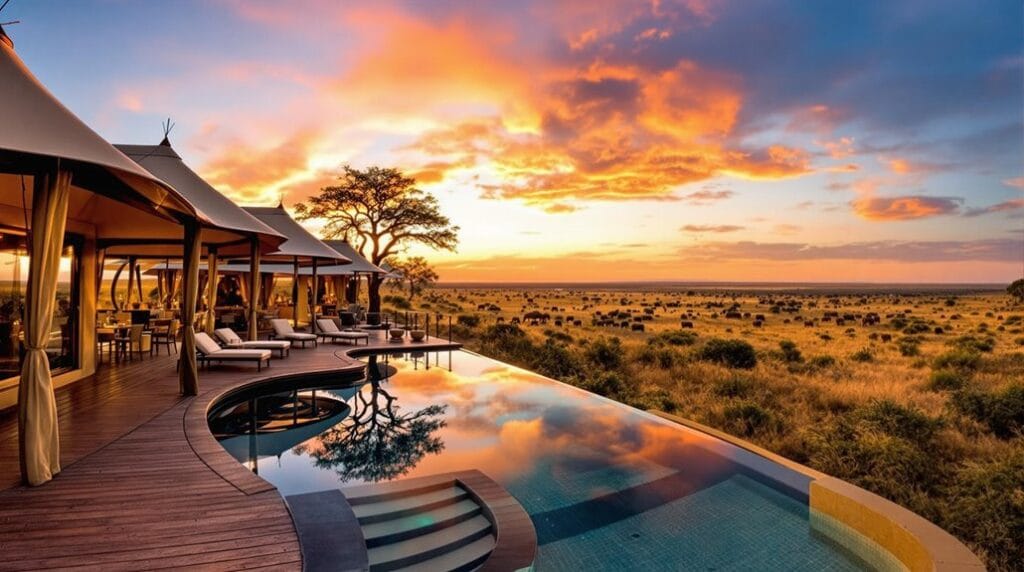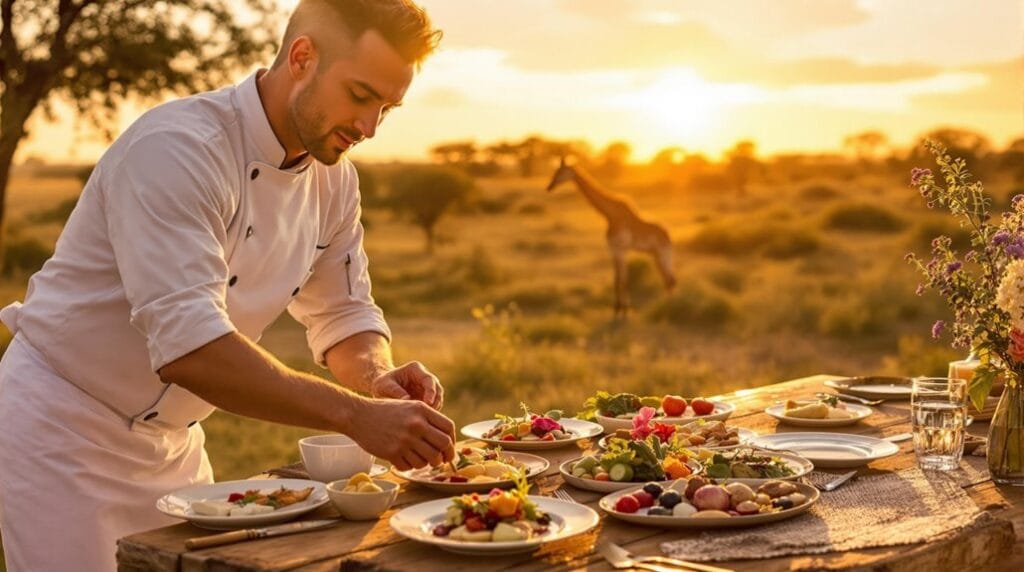African celebration rituals hold profound cultural significance, intertwining community identity and spiritual beliefs. They mark important life changes, renew ancestral ties, and foster social cohesion among participants. Each festival, from the vibrant colors of the Gerewol Festival to the spiritual cleansing of Timket, showcases unique customs and shared values. These events not only serve as platforms for communal engagement but also preserve traditions that connect generations. By participating in these rituals, you experience a rich tapestry of heritage that strengthens communal bonds. Explore further to uncover the diverse meanings behind these vibrant celebrations and their impact on cultural identity.
Key Takeaways
- African celebration rituals embody deep spiritual beliefs, reinforcing community identity and connections to ancestors.
- Festivals serve as platforms for communal participation, fostering social cohesion and cultural immersion.
- Rites of passage within rituals signify important life transitions, preserving cultural values across generations.
- Unique festivals, like Gerewol and Timket, showcase diverse local customs and enhance understanding of heritage.
- Rituals strengthen spiritual connections, nurturing a sense of belonging and collective identity within communities.
Nature of African Rituals
In many African communities, rituals serve as a vibrant tapestry woven from sacred values and rich cultural heritage. You'll notice that these rituals embody deep spiritual beliefs, often rooted in myths that resonate with the community's identity.
Organized around calendrical cycles, they mark specific times for fundamental observances like agricultural practices, ensuring that the rhythms of nature align with communal needs for rain and harvest.
Rites of passage are particularly significant, as they signify important changes in life—birth, adulthood, and marriage. These milestones are celebrated with great reverence, reinforcing one's connection to the community.
You might find that festivals and ceremonies not only honor these changes but also renew ties between ancestors and descendants, highlighting the cyclical nature of time and cultural identity.
Moreover, traditional rituals—whether agricultural, funeral, or cultural—play an essential role in maintaining social cohesion. They act as a collective memory, binding individuals together in shared experiences and values.
In this way, African cultural rituals foster a sense of belonging, reminding you that you're part of something much larger than yourself, rooted in history and tradition.
Functions of Traditional Festivals
Traditional festivals are vibrant expressions of community life that serve multiple functions, intertwining cultural identity with shared experiences. These traditional African celebrations renew connections between ancestors and descendants, emphasizing the cyclical nature of time and reflecting the community's history.
They provide a platform for communal participation, fostering social cohesion as you gather with others, sharing in the joy and collective memory.
- Cultural Immersion: Engage with traditional performances, offerings, and feasts that showcase the richness of your heritage.
- Preservation of Values: Experience how festivals help transmit essential cultural practices to future generations, ensuring that your cultural legacy endures.
- Spiritual Connection: Explore local beliefs that connect the seen and unseen domains, reinforcing community bonds through shared spirituality.
- Celebratory Unity: Join together as a community, celebrating not just the past but the present, strengthening ties that bind you.
Through these functions, traditional festivals become more than mere events; they're crucial lifelines to your culture, creating a sense of belonging that resonates deeply within you and your community.
Unique Celebration Types
Across Africa, unique celebration types reflect the continent's rich tapestry of cultures and traditions, each offering a distinct lens into community values and identity.
Consider the Bianou Festival in Niger, where Tuareg culture comes alive with vibrant preparations leading up to the event. Participants don indigo boubous and gather around the Etebel drum, showcasing their cultural pride.
In Chad, the Gerewol Festival invites you into the world of the Wodaabe people, where beauty and love take center stage. Young men, adorned in intricate face paint, engage in the Yaake dance, emphasizing that a smile is the ultimate expression of beauty.
Timket in Ethiopia draws thousands for a spiritual celebration of Epiphany, featuring grand processions with sacred tabots and a midnight reenactment of Jesus' baptism, culminating in mass baptism at dawn.
Meanwhile, Togo's Fire Dancing ritual demonstrates the Ewe initiates' deep connection to ancestral beliefs, as dancers walk on fire, believed to be shielded by spirits.
The Zangbeto Festival, also in Togo, honors traditional guardians of the night, showcasing the richness of local spiritual heritage and communal ties among African tribes.
Community Bonding and Identity
Celebration rituals in Africa act as powerful catalysts for community bonding and cultural identity, intertwining the past and present in vibrant displays of heritage. These events create a unique space where individuals come together, reinforcing their sense of belonging and shared purpose.
- The Bianou Festival in Niger showcases local traditions, promoting pride among participants.
- The Gerewol Festival in Chad highlights the importance of community in expressing cultural identity.
- During Timket in Ethiopia, thousands unite in spiritual celebration, strengthening social ties.
- The Zangbeto Festival in Togo involves collective participation, fostering unity through lively performances.
Each festival acts as a reminder of the intricate connections among community members. They celebrate rites of passage, like the Bull Jumping of the Hamar, which symbolize changes while reinforcing continuity across generations.
Traditional music and dance weave individuals into a collective narrative, enhancing social cohesion and allowing everyone to connect with their roots. Through these rituals, you not only honor your heritage but also deepen the bonds that tie you to others.
In this way, African celebration rituals serve as essential platforms for nurturing community bonding and preserving cultural identity.
Spiritual Connections and Beliefs
While many may view African celebration rituals as mere festivities, they actually serve as profound expressions of spiritual connections and beliefs that bind communities to their ancestors and the unseen domains. These rituals are deeply woven into the fabric of cultural identity, fostering a sense of belonging as people come together to honor their heritage.
Take, for instance, the Fire Dancing in Togo, where performers, driven by faith, walk on fire without burns, demonstrating their spiritual connection to ancestral protection. Similarly, the Zangbeto Festival showcases elaborate costumes and dances, each movement echoing the community's ties to supernatural guardians and ancestral spirits, reinforcing a shared spiritual heritage.
During festivals like Timket in Ethiopia, the act of mass baptism symbolizes spiritual cleansing and renewal, allowing participants to reconnect with their faith and strengthen communal bonds.
These rituals aren't just about celebration; they embody the essence of spiritual connections that define and enrich lives. Each dance, prayer, and offering deepens the ties to the past while nurturing a vibrant sense of community, reminding everyone that they're part of something greater, a lineage of shared beliefs and experiences.
Cultural Preservation Through Rituals
When you participate in African celebration rituals, you're not just enjoying a festivity; you're actively engaging in the preservation of cultural identity and heritage.
Each ritual, from the vibrant Zangbeto Festival to the poignant rites of passage, reinforces the spiritual ties to ancestors and the shared narratives that define community life.
Through these practices, you witness how traditions adapt yet remain steadfast, ensuring that valuable histories and customs thrive across generations.
Rituals as Cultural Identity
Rituals are essential threads woven into the fabric of cultural identity, reflecting the sacred values and historical narratives that shape a community's existence. When you participate in these rituals, you're not just an observer; you're affirming your place in a continuum of shared heritage.
These ceremonies are designed to connect you with your roots, grounding you in a rich tapestry of traditions.
- Rites of passage, like initiation ceremonies, mark significant life changes.
- Festivals rooted in agricultural cycles renew bonds between ancestors and descendants.
- Traditional performances, such as the Zangbeto Festival in Togo, celebrate community beliefs.
- Oral storytelling intertwined with rituals guarantees cultural values are passed down.
Through these rituals, you can experience a profound sense of belonging, reinforcing communal ties that withstand the challenges of globalization.
They serve as a reminder of who you're and where you come from, enabling you to carry forward the essence of your culture.
Spiritual Connection and Heritage
Engaging in African celebration rituals opens a pathway to spiritual connection and a deeper understanding of heritage. These rituals serve as essential expressions of local beliefs, intertwining your community's relationship with ancestors and the unseen world. As you participate, you'll notice how these ceremonies align with agricultural cycles, marking seasonal changes that reflect a profound dependence on nature.
Each festival is a living tapestry of performances and offerings dedicated to deities and ancestors, weaving continuity across generations. This communal participation fosters social cohesion, reinforcing both your cultural identity and the shared values that bind your community together.
Through oral traditions and storytelling, these rituals preserve historical narratives and cultural legacies, ensuring that knowledge and practices flow seamlessly to the next generation.
You'll feel the weight of history and the vibrancy of life as you partake in these celebrations, cultivating a spiritual connection that's both personal and collective. In this space, you'll discover not just who you are, but also where you come from, deepening your sense of belonging in a world that often feels disconnected.
Access and Participation Challenges
Although access to discussions on African celebration rituals can enhance understanding and appreciation of these cultural practices, significant barriers often restrict participation. These access and participation challenges create a gap between those enthusiastic to learn and the rich cultural heritage that awaits them.
- Institutional sign-ins limit access to only those affiliated with academic institutions.
- Society-specific credentials can be a barrier for individuals outside these networks.
- Personal account creation offers some flexibility, yet not everyone knows how to navigate this option.
- Subscription limitations hinder librarians' ability to provide extensive resources.
These challenges can prevent meaningful engagement with cultural content, ultimately impacting the preservation and understanding of African celebration rituals.
When you face these obstacles, it may feel isolating, as if the vibrant stories and teachings of your heritage are just out of reach.
Recognizing these barriers is the first step toward fostering a more inclusive environment where everyone can contribute to, and benefit from, the rich tapestry of African cultural celebrations.
Adventure Travel Opportunities
When you explore adventure travel opportunities in Africa, you'll find vibrant cultural experiences waiting at festivals like the Gerewol in Chad or Timket in Ethiopia.
These unique events not only allow you to participate in local traditions but also connect you with the diverse heritage of various tribes across the continent.
With a range of travel packages tailored to different interests and budgets, your journey can be both enriching and unforgettable.
Vibrant Cultural Experiences
Adventure travel in Africa opens doors to vibrant cultural experiences that immerse you in the continent's rich traditions and rituals.
You'll find yourself surrounded by the lively beats of drums, the scent of traditional meals, and the warmth of community gatherings. Each festival tells a story, inviting you to be part of something greater than yourself.
- Witness the Bianou festival, where Tuareg culture comes alive through music and dance.
- Join the Gerewol festival, celebrating Wodaabe beauty standards with colorful attire and unique rituals.
- Explore Ghana, Togo, and Benin to engage with local Voodoo traditions, adding depth to your understanding of African culture.
- Participate in communal feasts and performances that foster social cohesion, leaving you with lasting memories.
Unique Festival Participation
Experiencing Africa's vibrant festivals firsthand offers a unique way to engage with the continent's diverse cultures. Imagine joining the Gerewol Festival in Chad or the Timket celebration in Ethiopia, where you're not just a spectator but an active participant in communal rites and rituals.
Adventure travel opens doors to these cultural festivals, immersing you in local traditions that shape identities and foster social bonds. As you traverse multiple countries, you'll discover the rich tapestry of tribal customs, from voodoo practices in Ghana to the lively Zangbeto Festival in Togo.
Each festival provides an opportunity to savor communal feasts and witness mesmerizing performances, deepening your understanding of their cultural significance.
These experiences don't just enhance your journey; they also contribute to preserving traditional practices and supporting local economies. With various pricing options available, adventure travel is accessible, allowing you to choose a tour that fits your budget and preferences.
Diverse Travel Packages
Diverse travel packages in Africa offer an exciting gateway to some of the continent's most vibrant cultural celebrations. You'll find adventure tours that immerse you in local traditions, like the enchanting Gerewol Festival in Chad or the colorful Timket in Ethiopia.
These experiences not only showcase Africa's rich cultural heritage but also foster a sense of belonging.
- Participate in traditional dances that connect you to the rhythm of the locals.
- Craft unique souvenirs under the guidance of skilled artisans.
- Savor authentic culinary delights that tell the story of the region's history.
- Explore multiple countries, including Ghana, Togo, and Benin, to witness diverse tribal customs.
Pricing varies to accommodate every traveler, from budget-friendly group tours to luxurious individual experiences.
Most itineraries prioritize authentic engagement, led by local experts who share valuable insights into the significance of each celebration.
You'll leave with a deeper understanding of Africa's cultural richness, feeling connected to the heart of its communities. Embrace the adventure and create lasting memories as you explore the continent's vibrant tapestry of celebrations.
Traveler Experiences and Feedback
Travelers who immerse themselves in African celebration rituals often find themselves enriched by the vibrant tapestry of local cultures. Many report that engaging in these fascinating tribal traditions offers unique insights into the values and beliefs that shape communities.
Festivals like the Gerewol Festival stand out, where the lively atmosphere fosters not just competition but also a profound sense of communal bonding.
Positive feedback emphasizes how important it's for itineraries to be well-organized, allowing visitors to authentically connect with local communities during ceremonies. Participants often share that events like Timket in Ethiopia provide not only spiritual fulfillment but also emotional connections to the culture's practices, deepening their understanding and appreciation.
Moreover, witnessing diverse rituals, such as the enchanting fire dancing in Togo, showcases the resilience and strength of indigenous traditions, leaving lasting impressions on travelers.
These experiences create a sense of belonging, drawing you closer to the heart of each culture you encounter. By embracing these rituals, you not only observe but also become part of a rich narrative that transcends geographical boundaries and celebrates our shared humanity.
Diverse African Destinations and Events
Africa bursts with vibrant festivals and cultural celebrations that reflect its rich tapestry of traditions and heritage. Each unique event offers a glimpse into the diverse African destinations and events, drawing you closer to the continent's heartbeat.
From the colorful displays of community spirit to profound spiritual connections, these celebrations can foster a sense of belonging.
- Bianou Festival, Niger: Experience the Tuareg culture through elaborate preparations and community participation.
- Gerewol Festival, Chad: Witness the beauty and love celebrated by the Wodaabe people with competitions and traditional dances.
- Timket Festival, Ethiopia: Join thousands in a grand procession commemorating the baptism of Jesus at dawn.
- Fire Dancing Ritual, Togo: Feel the intensity of Ewe initiates dancing on fire, showcasing their faith and connection to ancestral spirits.
These events highlight how cultural rituals not only reinforce social bonds but also connect individuals to their heritage.
Engaging in such vibrant experiences can bring you good luck and deepen your understanding of Africa's diverse cultures.
Frequently Asked Questions
What Is the Cultural Significance of Rituals?
Ritualistic practices hold deep cultural significance as they connect you to your community and heritage. They embody shared values, marking life's changes and reinforcing social bonds.
When you participate in these rituals, you experience a sense of belonging and emotional regulation. These shared moments foster cooperation, strengthen intergenerational ties, and enhance your community's resilience.
Ultimately, rituals create a space where you can find comfort and celebrate collective identity.
Why Are Birth Rituals Important in African Culture?
Birth rituals in African culture are essential for connecting newborns to their ancestral spirits and community.
You'll find that these birth traditions foster a sense of belonging, ensuring the child's safe integration into society. Through communal blessings and support, you witness the reinforcement of social bonds and heritage.
Each tribe's unique customs, often accompanied by music and dance, celebrate new life and strengthen the cultural fabric that binds individuals together, promoting unity and continuity.
What Is the Importance of Rituals in African?
Rituals in African cultures are like a vibrant tapestry, weaving together community, identity, and history.
Their importance lies in their ritualistic diversity, which reflects varying beliefs and practices across regions. You'll find that these ceremonies mark life's milestones, strengthen social bonds, and honor ancestors, creating a sense of belonging.
They offer psychological comfort, helping you navigate change while preserving cultural heritage, ensuring that traditions thrive amid modern influences.
What Is the Significance of African Culture?
The significance of African culture lies in its rich tapestry of traditions that shape cultural identity.
When you engage with this diversity, you connect with over 3,000 tribes, each sharing unique languages and practices.
These traditions foster a sense of belonging and community, emphasizing the importance of collective experiences.
Through oral storytelling, music, and dance, you not only celebrate life's milestones but also preserve values and history, ensuring continuity for future generations.
Conclusion
In celebrating African rituals, you're not just witnessing traditions; you're stepping into vibrant communities where over 3,000 distinct ethnic groups thrive, each with unique customs. These festivals, rich in meaning, foster deep connections while showcasing the continent's diverse heritage. As you immerse yourself, you'll find that participation enhances your understanding of identity, spirituality, and communal bonds. So, whether it's a dance, a feast, or a storytelling session, each experience adds a colorful thread to the fabric of African culture.








